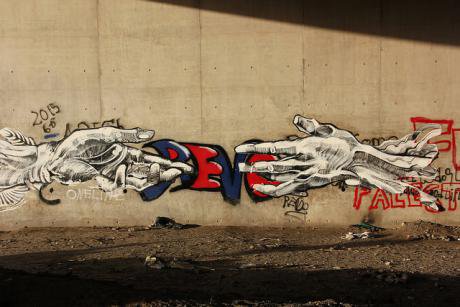
Calais jungle. Wikicommons/MalachyBrowne. Some rights reserved.Last week, a meeting took place in the British House of Commons which sought to highlight some of the less discussed aspects of the UK’s 2014 Immigration Act and the 2015-16 Immigration Bill.
One of the speakers on the panel[1], the long-serving Liberal Democrat peer, Baroness Sally Hamwee, described the latter as “the nastiest bill I’ve ever come across”.
Indeed, the Bill creates a new offence of illegal working and gives immigration officials wide-ranging powers to seize property and earnings, to close down businesses and to enter and search properties. Its impact will be felt widely on small businesses such as late-night takeaways and off licences, which may be less able than larger organisations to deal with the additional burden of carrying out and recording frequent and complex immigration checks.
The Bill makes it a criminal offence to be found working without the right papers, punishable by a prison sentence of up to 12 months and an unlimited fine. It also withdraws support from failed asylum seekers with children who currently get £5 per day and accommodation.
Campaigners warn the Bill will lead to discrimination against minorities, encourage exploitation of migrant workers by removing safeguards and help create an underclass of people removed from the protection of the law.
One of the most controversial aspects of the legislation is the obligation placed on landlords to verify the immigration status of tenants. Landlords across the country will be liable for a fine or imprisonment for up to five years if they let out a property to a migrant without the ‘right to rent’, instead of just a fine as set out in the 2014 Immigration Act.
In some circumstances, landlords will be guilty of an offence even if that migrant is not the tenant named on the lease but someone staying in the property. There is already evidence that in order to avoid risk of prosecution, landlords are discriminating against tenants who appear ‘foreign’.
However, this is just one aspect of the social and political processes that these bills embody and which are threatening to transform British society. This will become a society in which virtually everyone is required to become (untrained and unpaid) border-guards while large sections of the population (especially BAME) are suspected of being illegal (or, at least, illegitimate) border-crossers.
This applies to virtually all spheres of social life, not just housing: employment, education, health, banking – even driving. And although the UK is at the forefront of these developments, this is a phenomenon which is spreading all over Europe and globally.
Out-sourcing the external border
In this article, we argue that rather than reinforcing citizens’ security, everyday bordering has become the major mechanism of controlling diversity and (‘common sense’ populist) discourses on diversity. We also link this directly to neo-liberal out-sourcing of external and internal borders.
Academics, including Ruben Andersson, activists such as Don Flynn and our own research in London, Dover and Calais all testify to how the multi-scalar out-sourcing of border-making and border control to private businesses and ordinary citizens is a practice that links both external and internal border regimes. Andersson has referred to the boom this has created for private sector firms as an ‘illegality industry’, in which public funds are ploughed into developing further means by which to strengthen external borders.
The £830 million spent by the UK Home Office on the failing e-borders scheme meant to collect and analyse data on everyone travelling to and from the UK is just one British example. Furthermore, out-sourcing often involves partnerships with regimes whose treatment of their own citizens falls well below that which we might expect of partner states. Over the last two decades there have been clear shifts in policy, as European nations and the EU itself have attempted to foist the job of securing their borders onto neighbours. Out-sourcing territorial borders involves the transfer of funds and when faced with challenges from neighbouring states about the impact of maintaining such border regimes, those states respond by allocating more resources or funds to the existing arrangement.
The detail of each border differs but our research at the juxtaposed border controls in Calais, and the experience of humanitarian organizations such as Doctors of the World demonstrate the failure of the out-sourcing of the UK border to France. The placing and strengthening of the UK border in France, has resulted in thousands of increasingly desperate people existing in a ‘camp’ that had it been anywhere else in the world, as Leigh Dayton said, would have led to televised fundraising appeals.
Out-sourcing the internal border
At the same time as we have seen the burgeoning of ‘out-sourced’ border-making on external borders, we have seen the emergence of ‘everyday border-guards’ as the administration of the internal borders is made the responsibility of ordinary citizens.
These processes of internalization reflect an acceptance that territorial border securitization is an impossibility for any modern state. As Don Flynn from Migrant Right’s Network argues, this approach began in the 1990s in the UK, but has undergone a process of intensification since the 2014 Immigration Act. Under this legislation and the 2015-16 Immigration Bill, the UK government has sought to extend the ‘hostile environment’ which will make life in the UK for undocumented migrants and those without the right to work untenable.
It criminalizes the everyday life of unauthorized workers by creating offences for ‘illegal working’, ‘driving when unlawfully present in the UK’ and depriving them of the ‘right to rent’.
Its impacts are wide-ranging and stretch far beyond the lives of undocumented migrants, as in spite of new resources given to Home Office Immigration Enforcement teams, the main burden for administering the new legislation falls on people across the UK. Landlords, employers, bank employees, education and health care professionals have become responsible for checking the immigration status of their tenants, employees, students and patients. The 2015-16 Immigration Bill proposes larger fines and up to 5-year prison terms for employers and landlords who do not comply with their border-guard roles. Activists from housing, health and migrant support organizations have demonstrated how these internal bordering regimes that encourage suspicion within communities and are supported by fears of prosecution are already leading to increasing everyday racism through landlords and health workers refusing to rent to, employ or treat people with complex immigration status or who they perceive as ‘foreign’.
Unless we return the border to the margins of our society and lives rather than allowing it to become a more and more dominant feature of our everyday, our lives will become more precarious, more conflictual and more vulnerable to extremist ideologies of all sides.
Neo-liberal ideologies demand the minimization of the state and the privatisation of more and more agencies of what used to be the welfare state. However, in the case of the 2014 Immigration Act and 2015-2016 Bill, the out-sourcing of border-guarding is not (just) going to paid expert agencies but are imposed as part of the unpaid daily citizenship duties of people in Britain.
When (usually male) citizens of a state are required to serve in their country’s militaries as part of their citizenship duties they are given professional training and are not criminalized for failing to hit the enemy unless proven to be doing so wilfully. The new immigration legislation imposes border-guard duties with no such training and with no regard to ability or motivation of those who fail in their duties.
Concluding remarks
As was pointed out to us in the parliamentary meeting, it’s most probably too late now to mobilize opposition to the current Immigration Bill, although hopefully some campaigning organizations will mount some legal challenges to the more draconian aspects of the Act as it is rolled out.
However, our task is much more pervasive and long term. It is to deconstruct the ‘naturalized’ common sense that legitimizes such legislation and practices and which are threatening to undermine not just the civil liberties of all the people living in Britain but also the convivial multi-ethnic multi-cultural society which has been one of the best aspects of life in the UK, especially in its metropolitan centres.
We hope that many openDemocracy readers will join us in our campaign. Together with the other organizations which sponsored our film we’re touring the country, showing the film and discussing its implications. The MRN has organized a steering group which is coordinating all aspects of resistance to ‘everyday bordering’. As many have pointed out, we first need to imagine and then create alternatives to this current ‘common sense’ rhetoric, to enable and support a strong challenge to it.
[1] The meeting was organized by the BORDERSCAPES team at the research centre on Migration, Refugees and Belonging (CMRB) of the University of East London. Welcomed by Nira Yuval-Davis, team director, it was chaired by Labour MP Meg Hillier and other speakers included SNP MP Stuart C McDonald , Lucy Jones (Doctors of the World) and Rachel Robinson (Liberty). During the first part of the meeting, the film Everyday Borders was shown. The film, directed by Orson Nava and produced by Georgie Wemyss is a result of cooperation between the University of East London team, Migrants' Rights' Network, Southall Black Sisters and the Refugee and Migrant Forum of Essex and London (RAMFEL).
Read more
Get our weekly email



Comments
We encourage anyone to comment, please consult the oD commenting guidelines if you have any questions.